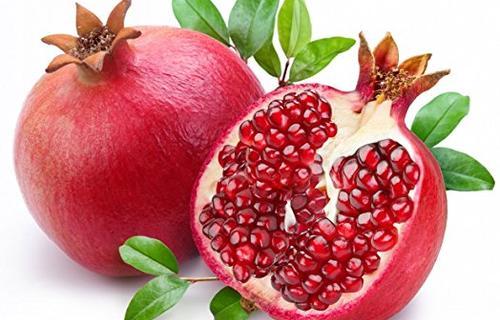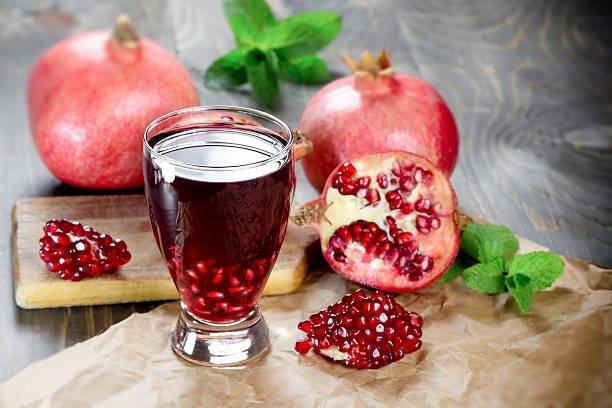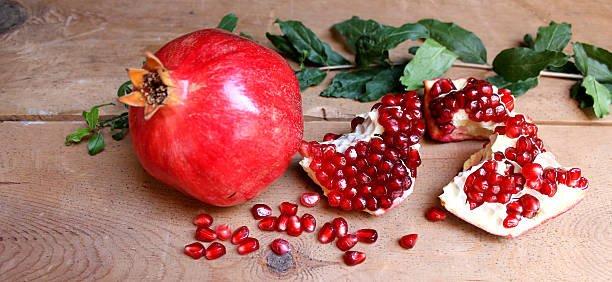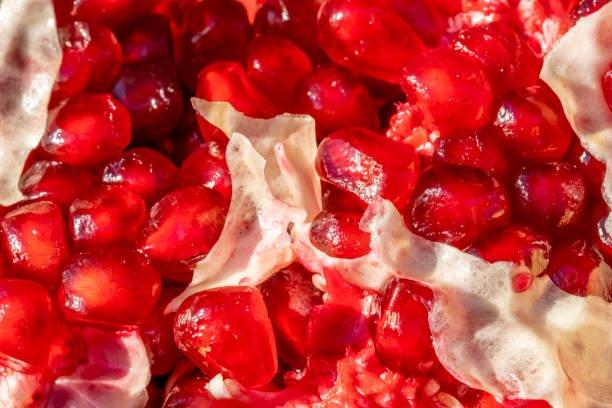Amazing Health Benefits of Pomegranate

Pomegranate is a beautiful fruit with amazing health benefits. Its outer texture is slightly stiff, round, and red. Its crown on top is part of the flower that makes the Pomegranate. The top part looks like the crown on the Pomegranate, which is very lovely.
Its internal structure consists of a thin and thick peel of light yellow color, which divides it into many boxes inside. Inside these boxes are juicy, beautiful, bright, and shiny pomegranate seeds that are very beautiful to look at and delicious to eat.
It is known for its superb nutrition and health benefits. The seeds are the tasty and juicy part of the fruit and are often used in cooking, baking, salads, and beverages. Pomegranate juice, extracted from the seeds, is also a popular and nutritious drink. Pomegranate seeds are rich in antioxidants, vitamins (vitamins C and K), and dietary fibre.
When eating pomegranates, it is essential to note that the seeds are edible, while the outer peel and inner pit are generally not eaten. Pomegranates can be used fresh, juiced, or garnished in various dishes.
Historical Significance of Pomegranate:
Pomegranate is a fruiting shrub or small historical tree. It belongs to the Lythraceae family. Its scientific name is Punica granatum. It is a healthy fruit full of nutrients. They have been cultivated and used in different cultures worldwide for centuries. They are native to northern India, extending from Iran to the Himalayas. This fruit is valued not only for its sweet and sour taste but also for its potential health benefits.
Pomegranate is a beautiful fruit with excellent taste and has numerous benefits. It is the fruit of heaven. The Holy Quran has described the Pomegranate as the fruit of Paradise. Pomegranate is native to Iran, and its formal cultivation started in Iran. The pomegranate tree is about five to seven meters tall and bears red flowers that later turn into delicious and beautiful fruits.
The Pomegranate is one of the oldest fruits in the world. According to the Torah, Hazrat Solomon (peace be upon him) had pomegranate gardens. Pomegranates were also among the things that reminded the Israelites during their desert journey. The Muslim Ummah has been given the good news of being granted Paradise. In ancient Greece and Egypt, people considered it a symbol of racial fertility and immortality, but now, new research has shown that pomegranates have fantastic health and medical benefits.
They occur in many parts of the world during the fall and winter. It also has cultural and symbolic significance in various traditions and religions. In some cultures, the fruit is associated with fertility, abundance, and prosperity.
Varieties of Pomegranate according to colour and taste:
In terms of colour, there are two types of Pomegranate: red and white.
Red Pomegranate:
The outer skin of a red pomegranate and its seeds or seeds are also red. Red like ruby red and shiny and studded like pearls in separate boxes, the pomegranate seeds or seeds, which are nature’s masterpieces, look beautiful and attract attention.
White Pomegranate:
The skin of a white pomegranate is light green, yellow, and reddish brown, and the seeds or seeds are white. Inside the Pomegranate is a thin yellow skin that encloses the diamond-like sparkling white pomegranate seeds in separate cells.
Varieties of Pomegranate by Taste:
It has three types depending on the taste. They have Sweet, sour, and sour-sweet tastes. All these three varieties are rich in medicinal and nutritional properties. Pomegranate fruit gives joy and refreshment to the heart and mind to such an extent that according to a prophetic saying, by using it, the substance of hatred and envy disappears in a person. Pomegranate peel also has many benefits. So, the Pomegranate is a beneficial fruit with immense medical benefits.
Health Benefits of Pomegranate:
The benefits of pomegranate are abundant in Ayurvedic, Allopathic and Unani medicine. Eating this delicious fruit can give you many benefits, which you may have to use many bitter and expensive medicines to achieve artificially. Pomegranate is a nutritious fruit with a long history of medicinal use, believed for its potential health benefits.
The ruby red fruit of the Pomegranate is native to the Middle East but is nowadays cultivated worldwide. Pomegranates are juicy and full of essential nutrients, antioxidants, and bioactive compounds rich in their numerous health-promoting properties. Now, new research also proves that pomegranates have surprising health benefits. Are affected.
According to University of California Los Angeles experts, pomegranate juice contains 100 polyphenols and antioxidants, making it a ‘super fruit.’ Nutritionists say that pure juice should be drunk during the pomegranate season, which is very beneficial for health. Pomegranate and its juice are an excellent source of fresh blood in the body, so people of all ages should consume it to stay healthy and energetic. Pomegranate is a versatile and tasty fruit. In large quantities, it contains minerals, fats, carbohydrates, potassium, calcium, magnesium, copper, iron, sulfur, phosphorus, vitamins, and especially vitamin C.
Pomegranate refreshes the heart and mind. It is an excellent remedy for blood deficiency. It is a boon, especially for pregnant women, and relieves iron deficiency, nausea, vomiting, and indigestion during pregnancy. Pomegranate restores vigour by instantly removing weakness caused by bloody haemorrhoids or loss of blood in any other way. It is also an elixir for patients with malaria, dengue fever, and blood cancer who have reduced red blood cells and severe weakness. Pomegranate is helpful for excess bile in the liver, heart, blood disorders, jaundice, and other liver diseases.
Pomegranate contains iron and hydrochloric acid. Eating Pomegranate increases appetite. Pomegranate is rich in vitamin A and vitamin B. The salt acid in Pomegranate strengthens the Stomach and helps digest food. Jaundice is a valuable medicinal and natural food for spleen diseases, cough, chest pain, loss of appetite, and typhoid. USDA
If honey is added to pomegranate juice, ageing is reduced. One cup of pomegranate juice contains nutrients equal to two chapatis. Pomegranate is a valuable fruit for stomach weakness. Therefore, it has a strong stomach and a muscular chest as well. It is a superior tonic that strengthens the lungs by expelling phlegm from the lungs and is helpful in anaemia, blood pressure, piles, and bone pain.
Nutrition:
 | |
| Nutritional value per 100 g (3.5 oz) | |
|---|---|
| Energy | 346 kJ (83 kcal) |
Carbohydrates | 18.7 g |
| Sugars | 13.67 g |
| Dietary fibre | 4 g |
Fat | 1.17 g |
Protein | 1.67 g |
| Vitamins | Quantity %DV† |
| Thiamine (B1) | 6% 0.067 mg |
| Riboflavin (B2) | 4% 0.053 mg |
| Niacin (B3) | 2% 0.293 mg |
| Pantothenic acid (B5) | 8% 0.377 mg |
| Vitamin B6 | 6% 0.075 mg |
| Folate (B9) | 10% 38 μg |
| Choline | 2% 7.6 mg |
| Vitamin C | 12% 10.2 mg |
| Vitamin E | 4% 0.6 mg |
| Vitamin K | 16% 16.4 μg |
| Minerals | Quantity %DV† |
| Calcium | 1% 10 mg |
| Iron | 2% 0.3 mg |
| Magnesium | 3% 12 mg |
| Manganese | 6% 0.119 mg |
| Phosphorus | 5% 36 mg |
| Potassium | 5% 236 mg |
| Sodium | 0% 3 mg |
| Zinc | 4% 0.35 mg |
| Other constituents | Quantity |
| Water | 78 g |
| |
| †Percentages are roughly approximated using U.S. recommendations for adults. Source: USDA FoodData Central | |
Helps in weight loss:
Experts associated with Oxford University in the United Kingdom have presented an analytical report containing the research conducted on pomegranates by various institutions and scientists during the past year. Accordingly, the Pomegranate is the fruit that has the best health benefits of all the fruits, which has the most benefits compared to the competition.
By drinking pomegranate juice daily, fat around the waist gets lost. Its natural ingredients play an essential role in melting fat by destroying obesity-causing cells, and it is also an excellent tonic for reducing mental stress. Pomegranates are relatively low in calories and rich in fibre. They reduce overall calorie intake. These make the perfect breakfast for those who want to lose weight. Trusted source
Pomegranate is a nutritious fruit that can be part of a healthy diet. Still, it is essential to clarify that no magic diet directly leads to weight loss without any effort or consideration of overall dietary patterns. Weight loss usually happens when you burn more calories than you consume over a sustained period. Pomegranates may benefit weight loss due to their nutritional and potential effects on appetite and metabolism, but they will not directly cause weight loss on their own.
Here’s how pomegranates can contribute to a weight-loss-friendly diet:
Low calories and fibre: Pomegranates are relatively low and rich in dietary fibre. Fibre can help you feel fuller longer, reduce the likelihood of overeating, and help with portion control.
Nutritious: Pomegranates are packed with vitamins, minerals, and antioxidants to support overall health and wellness during weight loss.
Natural Sweetness: Pomegranate has a naturally sweet taste, which helps healthily satisfy sweet cravings.
Hydration: Pomegranates are high in water content, which can contribute to hydration and possibly support feelings of fullness.
Potential metabolism booster: Some studies show that compounds found in Pomegranate, such as polyphenols, can positively affect metabolism. However, the effects are relatively small and should not be relied upon as the primary weight loss means.
Support for healthy eating habits: Adding Pomegranate to your diet can be part of an overall beneficial eating plan that includes Different types of fruits, vegetables, lean proteins, healthy fats, and whole grains.
Adopting a balanced, calorie-controlled diet and regular physical activity is critical to successful and sustainable weight loss. While pomegranates can be a nutritious addition to your diet, focusing on creating a healthy and sustainable lifestyle is essential.
Consulting with a professional healthcare or registered dietitian is a good idea if you are considering changing your diet for weight loss.
Boosting Immunity:
Vitamin C, in significant amounts in pomegranates, is essential for a robust immune system. Regular consumption of Pomegranate can help the body fight infections and diseases. Vitamin C is the best ingredient for boosting immunity, and pomegranates contain four times more vitamin C than apples. Apart from this, it also has vitamin E in sufficient quantity. Trusted source
Pomegranates are often considered a nutritious fruit that may contribute to overall health, including immune system support. They are rich in various nutrients and bioactive compounds that can positively affect immunity. However, it’s important to note that while pomegranates can be a part of a healthy diet, they are not a magical solution for boosting immunity.
Pomegranates contain:
Vitamin C: This vitamin is known for its immune-supporting properties. It can help boost the increase of white blood cells necessary for fighting infections.
Antioxidants: Pomegranates are rich in antioxidants like flavonoids and polyphenols. These compounds help defend cells from oxidative tension and inflammation, which can help to a healthier immune system.
Anti-inflammatory Properties: Pomegranates have been studied for their potential anti-inflammatory effects. Chronic inflammation can weaken the immune system. So, anti-inflammatory foods can be beneficial.
Fibre: Pomegranates are an excellent dietary fibre source, supporting gut health. An essential portion of the immune system is located in the gut, and a healthy heart can positively influence overall immunity.
Micronutrients: Pomegranates contain various micronutrients like potassium, folate, and vitamin K, which play roles in overall health and could indirectly support immune function.
While pomegranates can be a valuable addition to a balanced diet that supports immune health, they should not be solely relied upon to boost immunity. A routine system requires a combination of factors, including a well-rounded diet, regular exercise, sufficient sleep, stress control, and avoiding harmful habits like smoking or excessive alcohol consumption.
Always consult professional healthcare before making significant changes to your diet, especially if you want to address specific health concerns or conditions.
Beneficial for skin and hair:
The antioxidants in pomegranates contribute to healthier, more youthful-looking skin by combating oxidative stress and promoting collagen production. Pomegranate extract is often used in skin care products to improve skin texture and tone.
If you drink eight ounces of pomegranate juice daily, your skin will be free of blemishes, youthful, and glowing. Pomegranate juice protects your skin from dryness and roughness in winter due to pinonic acid. This acid strengthens the hair roots, which reduces hair fall. For this reason, more and more people are now using pomegranate oil on their skin and hair. Trusted source
Pomegranates benefit skin and hair health due to their rich nutritional content. They contain antioxidants, vitamins, minerals, and other bioactive compounds that are helpful to these benefits. Here’s how pomegranates can be good for your skin and hair:
For Skin:
Antioxidant Properties: Pomegranates contain antioxidants, including vitamin C and polyphenols. These antioxidants help protect the skin from free radicals and unstable molecules that cause ageing and skin damage.
Anti-ageing: The antioxidants in pomegranates help prevent collagen breakdown, a protein that keeps your skin youthful and elastic. They can help decrease wrinkles and fine lines on the skin.
Hydration: Pomegranate contains compounds that help retain moisture, hydrate the skin, and prevent dryness and pigmentation.
Skin Regeneration: Pomegranates contain compounds that promote cell regeneration, aiding in the healing of wounds, scars, and blemishes.
U.V. Protection: Some studies suggest that pomegranates’ antioxidants offer protection against U.V. damage. However, it’s important to note that it’s not a substitute for proper sun protection.
Anti-Inflammatory: Pomegranate extracts have anti-inflammatory properties that can help soothe irritated or inflamed skin conditions, such as acne and eczema.
For Hair:
Improved Scalp Health: Pomegranates have antifungal and antibacterial properties that help maintain a healthy scalp by addressing dandruff and itching.
Hair Growth: Pomegranate contains punicic acid, an omega-5 fatty acid that improves circulation to the scalp. Improved blood flow can stimulate hair follicles, promoting hair growth.
Strength and Shine: The vitamins and minerals in pomegranates, such as vitamin E, vitamin K, and iron, contribute to strong and shiny hair.
Reduced Hair Loss: The antioxidants in pomegranates help protect hair follicles from damage and oxidative stress, potentially reducing hair loss.
How to Incorporate Pomegranates:
You can reap the benefits of pomegranates by including them in your diet or using pomegranate-based skincare and haircare products. Eating fresh pomegranate seeds, drinking pomegranate juice, or using pomegranate oil in your skincare routine are all ways to take advantage of their benefits.
However, it’s important to remember that while pomegranates can contribute positively to skin and hair health, they are just one part of a comprehensive approach to overall well-being. A balanced diet, proper skincare routine, hydration, and other healthy lifestyle habits are essential for maintaining healthy skin and hair. Consulting a dermatologist or healthcare professional is always recommended for skin or hair concerns.
Beneficial for blood pressure and heart:
Pomegranate is a delicious and beautiful fruit that has recently been revealed to be helpful in heart diseases and preventing the spread of many types of cancer.
Phytochemicals in pomegranates lower cholesterol and blood pressure, while drinking an ounce of fresh pomegranate juice daily can help prevent blockages in your carotid arteries that lead to strokes and other heart diseases. If blood pressure and low blood pressure patients consume sweet and sour Pomegranate sparingly after meals, it is helpful in all these disorders.
Pomegranate plays an essential role in promoting cardiovascular health. The fruit’s antioxidants, particularly Punicalagin and anthocyanins, help reduce the oxidation of LDL (“bad”) cholesterol, prevent arterial plaque build-up, and improve overall heart function. Pomegranate helps control blood pressure by promoting the production of nitric oxide. It improves blood flow and also reduces the risk of high blood pressure. Trusted source
Pomegranates are often considered beneficial for blood pressure and heart health due to their rich nutrition and potential therapeutic properties. Here are some ways in which Pomegranate can contribute to these aspects:
Antioxidant properties: Pomegranates contain vitamin C, polyphenols (flavonoids and tannins), and anthocyanins. These compounds help neutralize damaging free radicals in the body and decrease oxidative stress and inflammation. It can be especially beneficial for maintaining cardiovascular health.
Blood pressure regulation: Some studies show that consuming Pomegranate can help lower blood pressure. The high dietary nitrate content in Pomegranate is thought to contribute to this effect. Nitrates can help relax blood vessels, improve blood flow, and lower blood pressure.
Nitric Oxide Production: Pomegranate has been shown to increase nitric oxide production in the body. Nitric oxide helps dilate blood vessels, improve blood flow, and decrease stress on the cardiovascular system. It can be beneficial for people with high blood pressure (hypertension).
Cholesterol Management: Pomegranates can help regulate cholesterol levels. Some research suggests that consuming Pomegranate can lower LDL (bad) cholesterol and increase HDL (good) cholesterol levels. This balance is essential for heart health.
Effects of inflammation: Chronic inflammation is linked to various heart diseases. Pomegranates contain anti-inflammatory compounds, which help reduce the risk of heart disease.
Endothelial function: Pomegranate consumption is associated with improved endothelial function. An endothelium is the inner lining of blood vessels. An adequate supply of it is essential to maintain healthy blood pressure and prevent atherosclerosis.
Lower risk of atherosclerosis: Some studies show that pomegranates may help reduce the progression of atherosclerosis (plaque build-up in the arteries) by inhibiting oxidative stress and inflammation.
Antihypertensive effects: Pomegranate extract has been investigated for its potential antihypertensive effects. They can help lower blood pressure by relaxing blood vessels and improving overall vascular function.
Although pomegranates offer these potential benefits, it is essential to note that they are not a substitute for medical treatment. If you have cardiovascular problems or are taking medication for blood pressure or heart disease, it is recommended to consult a healthcare professional before making dietary changes.
Heart-healthy foods, including pomegranates, a balanced diet, regular exercise, and other lifestyle factors, can be essential to heart health.
Helpful in preventing cancer:
Preliminary research has shown that pomegranate components and juice attack cancer in many ways and do not harm healthy cells. Although more research is needed, initial estimates suggest that Pomegranate prevents changes in DNA (which leads to cancer).
Studies show that pomegranate extract can inhibit the growth of breast and prostate cancer and other cancer cells. The fruit’s anti-inflammatory and antioxidant properties and ability to promote apoptosis (programmed cell death) contribute to its potential role in cancer prevention.
According to experts, para-oxidase-1 (PON-1), a critical cancer-fighting enzyme in Pomegranate, relieves oxygen deficiency and inflammation that cause DNA changes and thus prevents cancer. In addition, it has been observed that PON1 is present in deficient levels in cancer patients.
Pomegranates also prevent cancerous cells from spreading to other healthy parts, and at the same time, drinking pomegranate juice daily reduces inflammation and irritation in the body. On this basis, experts say that pomegranate Eating helps prevent breast cancer and prostate cancer. Another research study found that pomegranate juice inhibited the spread of breast cancer by 80%.
On the other hand, research has shown that Pomegranate also plays a vital role in preventing lung and colon cancer. For this, pomegranate ingredients were tested on animals in the laboratory, and two-thirds reduced the cancerous tumours of both diseases. A juice of crushed Pomegranate is beneficial for mouth sores.
Pomegranates are often touted for their potential health benefits, including their potential to help prevent. At the same time, some scientific research suggests that pomegranates may have specific properties that could be beneficial in decreasing the risk of certain types of cancer. Understanding that no single food can definitively prevent or cure cancer is essential. Cancer development is a complex process influenced by various factors, including genetics, lifestyle, and environmental exposures.
That being said, here are some components of pomegranates that have been studied for their potential anti-cancer properties:
Antioxidants:
Pomegranates are rich in antioxidants, notably polyphenols such as ellagitannins and anthocyanins. Antioxidants help neutralize damaged free radicals in the body, which can play a role in preventing DNA damage that could lead to cancer.
Anti-cancer effects:
Chronic inflammation is associated with a decreased risk of cancer development. Some studies suggest that the compounds found in pomegranates may have anti-inflammatory effects that could help reduce the risk of certain types of cancer.
Apoptosis Cancer Induction:
Apoptosis is a natural process of programmed cell death that helps remove damaged or abnormal cells from the body. Some research suggests that certain pomegranate compounds may promote apoptosis in cancer cells, potentially inhibiting their growth.
Angiogenesis Inhibition:
Angiogenesis is the process by which tumours develop a blood supply to support their growth. Some studies have suggested that pomegranate compounds could inhibit the development of new blood vessels in tumours, limiting their ability to grow.
Hormone Regulation:
Some research has looked at the potential of pomegranate compounds to modulate hormone levels, particularly related to hormone-sensitive cancers like breast and prostate cancer.
It’s significant to note that while these potential benefits are promising, much of the research has been conducted in laboratory settings or animal studies, and the effects observed may not directly translate to humans. Clinical studies involving humans are needed better to understand the specific impact of pomegranates on cancer prevention.
Incorporating pomegranates into a balanced diet and other fruits, vegetables, whole grains, and a healthy lifestyle can contribute to overall well-being. Consulting with professional healthcare before making significant dietary changes is recommended, especially if you have a history of cancer or other health con cancer.
How do we keep children healthy and prevent obesity?
Best health benefits of Strawberries
Best Health Benefits of Peaches
Rich source of antioxidants:
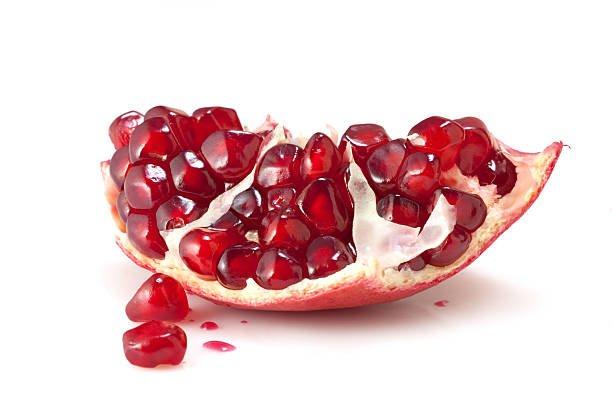 Pomegranates are known for their high content of antioxidants, including polyphenols, flavonoids, tannins, and anthocyanins. These compounds neutralize harmful free radicals and reduce oxidative stress and the dangers of chronic diseases like cancer, cardiovascular disease, and neurodegenerative disorders.
Pomegranates are known for their high content of antioxidants, including polyphenols, flavonoids, tannins, and anthocyanins. These compounds neutralize harmful free radicals and reduce oxidative stress and the dangers of chronic diseases like cancer, cardiovascular disease, and neurodegenerative disorders.
Of course, pomegranates are a rich source of antioxidants. They contain several potent compounds that are associated with various health benefits. The primary antioxidants found in Pomegranate are:
Polyphenols: Pomegranates contain polyphenols, including flavonoids, tannins, and anthocyanins. These compounds have been shown to have potent antioxidant and anti-inflammatory properties.
Pionic acid: It is a conjugated linoleic acid found in pomegranate seeds. It is a powerful antioxidant with various health benefits, including possible anti-cancer effects.
Vitamin C: Pomegranate is the best source of vitamin C, an essential antioxidant that helps protect cells from oxidative tension and supports the immune system.
Ellagic Acid: Found in both fruits and seeds, ellagic acid is known for its antioxidant and anti-inflammatory properties. It has been studied for its ability to inhibit the increase of certain types of cancer cells.
Quercetin: Another antioxidant in Pomegranate, quercetin, is known for its anti-inflammatory effects and ability to support heart health.
The antioxidants in pomegranates can help neutralize harmful free radicals in the body, which are molecules that cause oxidative harm to cells and contribute to different chronic diseases, including heart disease, cancer, and neurodegenerative disorders.
Regular consumption of pomegranates or their juice has been linked to different health benefits, such as improved heart health, reduced inflammation, and possibly reduced risk of certain cancers. However, it’s important to remember that while pomegranates are a valuable addition to a healthful diet, they should be part of a balanced regimen that includes fruit, vegetables, and other nutritious foods.
Helps to relieve inflammation:
Chronic inflammation is the cause of multiple health issues. Pomegranate has powerful anti-inflammatory properties attributed to other compounds. Regularly consuming Pomegranate helps relieve inflammatory conditions such as gout and inflammatory bowel disease. Certain compounds in pomegranates have demonstrated antibacterial activity against various pathogens, potentially helping prevent infections and supporting oral health.
Pomegranates have been studied for their potential anti-inflammatory properties due to their rich content of various bioactive compounds, particularly antioxidants. Antioxidants are known to combat oxidative tension and inflammation in the body. Pomegranates contain several compounds that contribute to their potential anti-inflammatory effects, including:
Polyphenols: Pomegranates are loaded with polyphenols, including flavonoids and tannins, known for their antioxidant and anti-inflammatory properties. These compounds help neutralize damaging free radicals in the body that can contribute to inflammation.
Punicalagins: Punicalagins are potent antioxidants found in pomegranates. They have been shown to have anti-inflammatory impacts by hindering the production of inflammatory cytokines and enzymes.
Ellagic Acid: This compound found in pomegranates has been studied for its anti-inflammatory effects. It may help reduce inflammation by modulating various cellular pathways in the immune response.
Vitamin C: Pomegranates are a reasonable source of vitamin C, which is also known to have antioxidant properties and can help mitigate inflammation.
Omega-5 Fatty Acid: Punicic acid, a type of omega-5 fatty acid in pomegranate seed oil, has been studied for its potential anti-inflammatory effects.
It’s important to note that while pomegranates and their components show promise in reducing inflammation, more research is needed to fully understand the extent of their benefits and how they compare to other anti-inflammatory agents. Additionally, the effects of pomegranates on inflammation can vary depending on factors like that individual’s overall diet, health status, and the specific inflammatory condition being addressed.
Incorporating pomegranates into a balanced and varied diet can improve overall health. Still, it’s always a good idea to consult with professional healthcare before making significant changes to your diet, especially if you seek specific health benefits like inflammation relief.
Helpful in digestive health:
Pomegranate contains dietary fibre, which helps maintain a healthy digestive system. Fibre promotes regular bowel movements, prevents constipation, and supports a balanced gut microbiome, which supports overall digestive health. It can cause constipation from food, including colic, and prevents jaundice; it is also valuable for heartburn and inflammation.
Pomegranates are often considered beneficial for digestive health due to several reasons:
Fibre Content: Pomegranates are an excellent dietary fibre source, essential for healthy digestion. Fibre helps prevent constipation and enables regular bowel movements by adding bulk to the stool.
Digestive Enzymes: Pomegranates contain enzymes that aid in digestion. These enzymes can help break down proteins and improve overall digestive efficiency.
Anti-Inflammatory Properties: Pomegranates contain compounds with anti-inflammatory properties, such as polyphenols and antioxidants. Inflammation in the digestive tract can cause digestive issues, so foods with anti-inflammatory effects can be beneficial.
Prebiotics: Pomegranates contain prebiotic compounds that promote the growth of beneficial gut bacteria. A healthy ratio of gut bacteria is crucial for proper digestion and overall gut health.
Hydration: Pomegranates have a high water content that may help keep the digestive system hydrated and functioning smoothly.
Antioxidants: The antioxidants found in pomegranates, such as vitamin C and other polyphenols, may help protect the gut lining from damage and contribute to overall gut health.
Aid in Detoxification: Pomegranates contain compounds that may support the body’s detoxification processes, helping to eliminate waste and toxins from the digestive system.
It’s worth noting that while pomegranates can contribute to digestive health, they are just one part of a balanced diet that supports overall well-being. Including various fruits, vegetables, whole grains, lean proteins, and healthy fats is essential for optimal digestive function. Professional healthcare should be consulted for personalized advice if you have any digestive concerns or medical conditions.
Helps to control diabetes:
Eating Pomegranates after meals helps control blood sugar levels. Pomegranates can help manage diabetes by improving insulin sensitivity and lowering blood sugar levels. Certain compounds in pomegranate help inhibit the enzymes that break down carbohydrates into simple sugars, leading to better blood sugar control.
Pomegranate is a nutritious fruit that has been researched for its possible health benefits, including its impacts on diabetes control. While research on the effects of pomegranates, specifically on diabetes, is ongoing, some evidence suggests that pomegranates may positively influence specific aspects of diabetes control. However, it’s important to note that Pomegranate should not be considered an alternative for medical treatment or a replacement for a balanced diet and proper diabetes control.
Here are a few ways in which Pomegranate may potentially help in controlling diabetes:
Antioxidant Properties: Pomegranates are rich in antioxidants, notably polyphenols, that may help protect cells from damage caused by oxidative stress. Oxidative stress is often increased in diabetes and is linked to complications associated with the condition.
Blood Sugar Regulation: Some studies show that consuming Pomegranate can help improve insulin sensitivity and decrease insulin resistance. Insulin opposition is a significant factor in the development of type 2 diabetes.
Anti-Inflammatory Effects: Chronic inflammation is associated with diabetes and its complications. Pomegranate contains compounds with anti-inflammatory properties, which may help reduce inflammation and its detrimental effects.
Heart Health: Diabetes increases the harm of cardiovascular complications. Pomegranate has positively impacted cardiovascular risk factors, including reducing blood pressure and improving cholesterol levels.
Glycemic Control: Some animal studies have indicated that pomegranate extract might help lower blood sugar levels by inhibiting certain enzymes involved in carbohydrate digestion, potentially leading to improved glycemic control.
Kidney Protection: Diabetes can lead to kidney harm over time. Some preliminary research suggests that Pomegranate may have a protective effect on the kidneys and could mitigate diabetes-related kidney damage.
It’s important to emphasize that while these potential benefits are promising, more research is needed to understand the mechanisms of Pomegranate’s effects on diabetes and to determine appropriate dosages for therapeutic use. If you have diabetes or any other medical condition, it’s essential to consult with professional healthcare before making critical dietary changes or adding supplements like Pomegranate to your regimen.
In summary, Pomegranate may offer some potential benefits for diabetes control due to its antioxidant, anti-inflammatory, and possible blood sugar-regulating properties. However, it should not replace standard medical treatments and lifestyle modifications recommended by healthcare providers.
For brain functions:
The antioxidants and phytochemicals in Pomegranate can help reduce stress and anxiety by modulating neurotransmitter levels and promoting relaxation.
Pomegranate’s antioxidants and anti-inflammatory compounds are believed to support cognitive function and protect against neurodegenerative diseases such as Alzheimer’s. Studies show that pomegranate extracts can enhance memory and learning abilities.
Pomegranates are rich in nutrients and bioactive compounds associated with potential benefits for brain health and cognitive function. Some of the components found in pomegranates that may contribute to these effects include:
Antioxidants: Pomegranates are a good source of antioxidants, including polyphenols like flavonoids and anthocyanins. Antioxidants help protect cells from oxidative tension and harm, which is essential for maintaining overall brain health.
Anti-inflammatory Properties: Chronic inflammation is thought to role play in various neurological diseases. Some researchers suggest that the anti-inflammatory effects of pomegranate compounds can help reduce inflammation-related brain harm.
Improvement in Memory: Limited research suggests that certain pomegranate compounds may positively impact memory and cognitive function. These effects are believed to be linked to the antioxidant and anti-inflammatory properties of the fruit.
Neuroprotective Effects: Pomegranate extracts have been studied for their potential neuroprotective effects. These effects help protect brain cells from damage and support overall brain function.
Blood Flow and Circulation: Pomegranate consumption has improved blood flow and circulation. Improved blood flow to the brain can have positive effects on cognitive function.
Aiding in Neurological Disorders: Some preliminary research suggests that pomegranate extract might have potential benefits in managing certain neurological disorders, such as Alzheimer’s disease. However, more rigorous studies are needed to establish these potential benefits.
It’s important to note that there is some promising research on pomegranate’s potential cognitive and mental health effects, but the scientific evidence is still developing. Most research has been conducted on animals or in vitro, and more human clinical trials are needed to understand the extent of its effects on humans fully.
Incorporating pomegranates into a balanced and healthy diet and other nutrient-rich foods can improve brain health. However, it’s always a good idea to consult with professional healthcare before making significant changes to diet, especially if you have any health conditions or are taking medications.
For bone health:
Pomegranate contains minerals like calcium and phosphorus, which are essential in maintaining strong and healthy bones. These minerals are necessary for preventing conditions like osteoporosis.
Pomegranates are nutrient-rich fruits that offer various potential health benefits. Still, their direct impact on bone health is less well-studied than other aspects of their nutritional profile. However, there are a few ways in which pomegranates could contribute to overall bone health:
Antioxidant Properties:
Pomegranates are rich in antioxidants, notably polyphenols. That may reduce oxidative tension and inflammation in the body. Chronic inflammation contributes to bone loss and osteoporosis over time, so consuming antioxidant-rich foods like pomegranates indirectly supports bone health.
Vitamin C:
Pomegranate is a superior source of vitamin C. That is essential for the synthesis of collagen. Collagen is one of the critical components of bone tissue, and adequate vitamin C intake is necessary for maintaining the integrity of bones and other connective tissues.
Phytochemicals:
Pomegranates contain various phytochemicals that may have potential bone-protective effects. For example, some studies suggest that compounds like ellagic acid and punicalagin found in pomegranates could promote bone health by influencing bone cell activity and mineral density.
Anti-Inflammatory Effects:
Pomegranate extracts have been studied to inhibit the activity of certain enzymes that can break down bone tissue. By reducing these enzymatic activities, pomegranate extracts could help preserve bone density.
While these potential benefits are promising, it’s important to note that the research on pomegranates specifically for bone health is limited, and more studies are needed to establish a definitive link. However, incorporating pomegranates into a balanced diet with other bone-supportive nutrients, such as calcium, vitamin D, and vitamin K, can contribute to overall bone health.
A holistic approach to bone health includes maintaining a healthy weight, avoiding smoking, regular exercise, and alcohol consumption. If you have concerns about your bone health, it’s a good idea to consult with a healthcare professional or a registered dietitian for personalized guidance.
For dental health:
Pomegranate’s antibacterial properties can help fight bacteria that contribute to plaque and gum disease, promoting oral health.
Pomegranates have been associated with various health benefits, including potential uses for dental health. While research is ongoing and more studies are needed to establish definitive conclusions, pomegranates contain several compounds that could contribute to maintaining good oral health:
Antioxidants:
Pomegranates are rich in antioxidants, such as polyphenols and flavonoids. These compounds can help lessen oxidative stress and inflammation in the oral cavity, potentially aiding in preventing gum disease (periodontal disease) and other oral issues.
Anti-Inflammatory Properties:
Pomegranate extract has been shown to have anti-inflammatory effects. Inflammation is one of the factors in gum disease and other oral infections. By reducing inflammation, pomegranates contribute to healthier gums and oral tissues.
Antimicrobial Effects:
Some studies suggest that pomegranate extract may have antimicrobial properties. This could help in inhibiting the growth of harmful bacteria in the mouth. They are responsible for gum disease and tooth decay.
Saliva Stimulation:
Pomegranate juice may stimulate the production of saliva. Saliva plays a necessary role in maintaining oral health by helping to rinse away food particles, neutralizing acids, and promoting the remineralization of tooth enamel.
Wound Healing:
Compounds in Pomegranate may assist in wound healing, which could benefit gum tissue repair and recovery after dental procedures.
It’s important to note that while pomegranates offer potential benefits for dental health, they are not a substitute for regular oral hygiene practices such as brushing, flossing, and regular dental check-ups. Including pomegranates as part of a balanced diet may complement your oral care routine, but it should differ from proper dental care.
As always, if you have specific dental concerns or conditions. Consult a dentist or healthcare professional before significantly changing your diet or oral care routine.
For liver health:
Compounds found in pomegranates, such as punicalagin, may protect the liver by reducing inflammation and oxidative stress, potentially benefiting people with liver conditions.
Pomegranates have gained attention for their potential health benefits, including their impact on liver health. While pomegranates contain various bioactive compounds that may benefit overall well-being, including liver health, it’s important to note that scientific research is ongoing. The effects may vary from person to person. Here are some potential ways in which pomegranates could contribute to liver health:
Antioxidant Properties:
Pomegranates are rich in antioxidants, such as vitamin C and polyphenols (including ellagic acid).
It can help neutralize dangerous free radicals in the body. This antioxidant activity may help protect liver cells from oxidative stress and damage.
Anti-inflammatory effects:
Chronic inflammation is commonly associated with liver diseases. Some studies show that pomegranates’ anti-inflammatory features can help reduce inflammation in the liver, potentially supporting its health.
Liver Enzyme Regulation:
Elevated levels of liver enzymes can indicate liver damage or disease. Some research suggests that pomegranate consumption may help regulate liver enzyme levels and improve liver function.
Fibrosis Prevention:
Pomegranate extracts have shown potential in animal studies to inhibit the development of liver fibrosis, which is the excessive accumulation of scar tissue in the liver that can result from chronic liver injury.
Fat Accumulation Reduction:
Non-alcoholic fatty liver disease (NAFLD) is a common liver condition characterized by fat accumulation in liver cells. Pomegranate consumption has been researched to reduce fat accumulation in the liver and improve NAFLD markers.
It’s important to remember that while these potential benefits are promising, more research is needed to establish how pomegranates influence liver health and determine appropriate dosages for therapeutic effects. Pomegranates can be a healthy addition to a balanced diet. Still, they should not be considered a standalone treatment for liver diseases if you have concerns about your liver health or any health condition. It is best to consult a medical professional before making significant dietary changes or starting supplements.
This information is correct as of the September 2021 information update. However, new research may have emerged since then, so I recommend checking with up-to-date and reliable sources or consulting a healthcare provider for the latest information.
Anti-allergic properties:
Pomegranates contain certain compounds that exhibit anti-allergic effects that help reduce the symptoms of allergic reactions.
Pomegranates have been studied for various potential health benefits, including their potential anti-allergic properties. While more research is needed to understand their effects fully, some evidence suggests that pomegranates may possess specific anti-allergic and anti-inflammatory properties.
Anti-Inflammatory Effects:
Pomegranates are rich in antioxidants, notably polyphenols like flavonoids and tannins. These compounds have anti-inflammatory effects, which could help reduce allergic responses. Inflammation is a crucial component of allergic reactions, so anything that can mitigate inflammation might help alleviate allergy symptoms.
Immune Modulation:
Some studies have suggested that by modulating immune responses, pomegranates may impact the immune system. This could help regulate the body’s immune reactions, including allergies.
Histamine Regulation:
Histamine is a compound released by the body during allergic reactions responsible for many allergy symptoms. Some research has indicated that pomegranate extract might have a role in reducing histamine release or its effects, which could help alleviate allergic symptoms.
Skin Allergies:
Pomegranate extract has been explored for its potential in managing skin allergies and conditions like atopic dermatitis. Certain compounds in Pomegranate may help soothe irritated skin and reduce allergic skin reactions.
Respiratory Allergies:
Pomegranate has also been investigated for its potential to reduce symptoms related to respiratory allergies. Some studies suggest that pomegranate extract may help reduce airway inflammation and improve lung function, which could benefit individuals with allergic asthma.
It’s important to note that while there is some promising research suggesting the anti-allergic properties of pomegranates, much of this research is preliminary and has been conducted in animal or cell culture models. Clinical studies involving human subjects are limited, and more research is needed to establish a clear connection between pomegranate consumption and allergy relief.
Suppose you have allergies or are considering using Pomegranate as a potential remedy. In that case, you must consult a healthcare professional before significantly changing your diet or treatment regimen. Allergies vary widely in severity and triggers; what works for one person may not.
For eye health:
Pomegranates contain nutrients like vitamins C and E and compounds like punicalagin, which can help maintain healthy vision and prevent age-related macular degeneration.
Pomegranates benefit eye health due to their rich nutrient content, particularly antioxidants. Here’s how pomegranates can contribute to maintaining good eye health:
Antioxidant Protection: Pomegranates are rich in antioxidants, including vitamin C and various polyphenols (flavonoids and tannins). These antioxidants help protect eye cells from harm induced by free radicals, which can contribute to age-related macular degeneration (AMD) and other eye conditions.
Reduced Inflammation: Pomegranates contain anti-inflammatory compounds that may help reduce inflammation in the eyes and the surrounding tissues. Chronic inflammation can be an essential factor in various eye diseases.
Vitamin C: Pomegranate is a valuable source of vitamin C, necessary for maintaining the health of blood vessels, including those in the eyes. Healthy blood vessels are essential for proper blood flow to the eyes and overall eye function.
Phytochemicals: Pomegranates contain specific phytochemicals, such as punicalagin and anthocyanins, linked to potential eye health benefits. These compounds help improve circulation to the eyes and support overall eye health.
Potential AMD Prevention: Some studies suggest that the antioxidants found in pomegranates could help decrease
Improved Blood Flow: Pomegranates may contribute to improved blood flow to the eyes, supporting the delivery of nutrients and oxygen necessary for maintaining optimal eye function.
It is important to note that while pomegranates can benefit from a healthy diet to support eye health, they should not replace regular eye care and screenings. A balanced diet rich in nutrients and regular eye check-ups is crucial for maintaining good eye health. Suppose you have concerns about your eyes or want to improve your health. It is to consult with a healthcare professional or an eye specialist.

